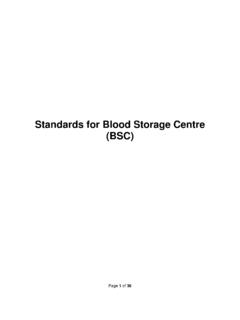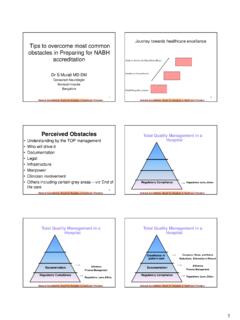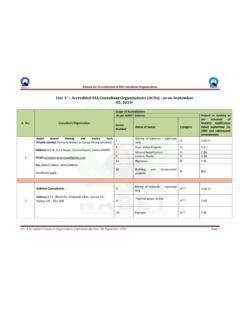Transcription of ISO/IEC 17025 INTERNAL AUDITOR TRAINING …
1 Page 1 / 18 nabet Criteria for accreditation of ISO/IEC 17025 INTERNAL AUDITOR TRAINING course quality council of india (QCI) has been established as an autonomous non-profit organisation to establish the National Accreditation Structure, jointly by the Government of india and the Indian Industry represented by the three premier industry associations, Associated Chambers of Commerce and Industry of india (ASSOCHAM), Confederation of Indian Industry (CII) and Federation of Indian Chambers of Commerce and Industry (FICCI). National Accreditation Board for Personnel and TRAINING ( nabet ), one of the Boards functioning under QCI, offers accreditation to the professionals in the relevant areas quality Environment, Food Safety, Occupational Health etc.
2 It also offers accreditation to the TRAINING course Providers who offer TRAINING courses for the quality Management Systems, Environment Management Systems and Occupational Health and Safety auditors namely Lead AUDITOR TRAINING Courses and INTERNAL AUDITOR TRAINING Courses. nabet is a member of International Personnel Certification Association (IPC), an international association of similar national bodies worldwide. nabet is now offering accreditation of ISO/IEC 17025 INTERNAL AUDITOR TRAINING course for the benefit of laboratories engaged in testing and/or calibration activities. This course will focus on the following: i) essential nature of INTERNAL Auditing ii) monitoring and verifying the effective implementation of Laboratory Management System iii) management of INTERNAL Audit iv) skills for conducting INTERNAL Audit v) competence of auditors and procedures for their evaluations Scope The programme is meant for personnel of all laboratories performing tests and/or calibrations and persons of laboratories where testing and/or calibration forms part of inspection and product certification.
3 The programme is also useful for laboratory clients, personnel of regulatory authorities and accreditation bodies who may use the knowledge gained in conforming or recognising the competency of testing and/or calibration laboratories. Pre-requisite Participants for this course shall have attended awareness course on ISO / IEC 17025 . Page 2 / 18 Section 2 course OBJECTIVES Learning Objectives Learning objectives describe what students must be able to do so by the end of this course . Students need to demonstrate acceptable performance in all of these areas in order to complete the course successfully and the TRAINING course provider will need to demonstrate a factual and objective approach to the assessment of student performance against the following.
4 General A participant who actively participates in the programme shall be able to describe the purpose of INTERNAL Audit, its importance as a management tool for monitoring and verifying the effective implementation of an organization s quality Management System including its quality Policy. Principles of INTERNAL Auditing A participant who actively participates in the programme shall be able to describe the essential principles of INTERNAL audit, which make the audit an effective and reliable tool in support of management policies and controls. Managing an Audit Programme A participant who actively participates in the programme shall be able to manage INTERNAL Audit Programmes effectively including issues such as.
5 I) to establish, implement, monitor, review and improve audit programme, and ii) to identify and provide the necessary resources Audit Activities A participant who actively participate in the programme shall be able to conduct INTERNAL audit effectively, which includes i) Initiating the audit, ii) Conducting document review iii) Preparing for the on site audit iv) Conducting on site audit v) Preparing the audit report vi) Effectiveness of corrective actions through follow-up audits. Competence and Evaluation of auditors A participant who actively participate in the programme shall be able to describe the: Page 3 / 18 i) Personal attributes of an AUDITOR to enable him to act in accordance with the principles of auditing ii) Generic and specific knowledge and skills of Laboratory management system auditors vii) Competence and evaluation of auditors The TRAINING course provider may develop more detailed learning objectives as appropriate Students achievement of the learning objectives shall be measured by the TRAINING provider.
6 Page 4 / 18 Section 3 course CONTENT Early in the course presentation, the course provider shall provide to the students a description of the course format, student responsibilities, how the student will be evaluated and the basis for each type of evaluation. The course shall cover: a) all aspects defined in the course Objectives and b) local requirements, culture, practices or approaches to auditing and the application of ISO / IEC 17025 as appropriate. Page 5 / 18 Section 4 course STRUCTURE, TRAINING METHODS AND FACILITIES Duration The total course time devoted to direct instruction and to assigned team and individual activities shall be at least 12 hours. If the course is given through interpreters, the time shall be increased as required to meet the learning objectives Time devoted to the meals, breaks or other free time is not included in the calculation of the course duration.
7 The course shall be presented during two consecutive days, unless otherwise authorized by nabet . TRAINING Methods TRAINING courses shall be designed to have a high degree of interaction between students and instructors. TRAINING methods shall seek to involve and engage students throughout the duration of the course . The TRAINING course shall include both knowledge based sessions (to facilitate understanding of concepts) and skill based sessions (application of knowledge and skills in practical activities) and each student shall be subjected to realistic quality system audit practices and conditions. Knowledge based sessions may be instructor led, but shall allow for some interaction with students enabling instructors to test learning and students to clarify their understanding as required.
8 Skills based sessions may be supported by instructor input to address the relevant requirements and techniques such as for managing meetings and interviews. Methods for validating student achievement of the learning objectives and for providing timely feedback shall be included in the course . Each student shall be required to participate in practical skills based activities: workshop, case studies, AUDITOR role playing or actual system audit situations. At least 50% of course time shall be used in such activities. Instructors shall demonstrate effective management of the course , including attention to time schedule, course content, requirements of the standard, instructor conduct and other course requirements.
9 TRAINING aids such as videos that are directly relevant may be used to supplement the TRAINING by the instructors. These may be commercial TRAINING videos or videos produced during the course to record and review the performance of students. No more than two hours of the total course time may be devoted to non-interactive, passive TRAINING aids. Class size ; Attendance The number of students in a class shall be no greater than twenty nor fewer than four. Students shall be required to be in attendance for the full duration of the course . Page 6 / 18 Number of Instructors The Instructors shall have at least five years of working in the field of Testing and Calibration.
10 The Instructors shall preferably be empanelled with NABL (National Accreditation Board for Testing and Calibration Laboratories. The Lead instructor shall be appointed on the basis of qualification criteria decided by the TRAINING course provider and so approved by nabet . The Lead Instructor shall be actively involved in instruction and evaluation for the full duration of the course . Additional resource people or trainee instructors may be used for specific subjects or activities, however the main instructor/s remain responsible for the entire course offering. When specific activities (ex. Written quizzes etc.) involve neither instruction nor evaluation and do not require the availability of the instructors for explanation, clarification or advice, any one instructor need be present.)




